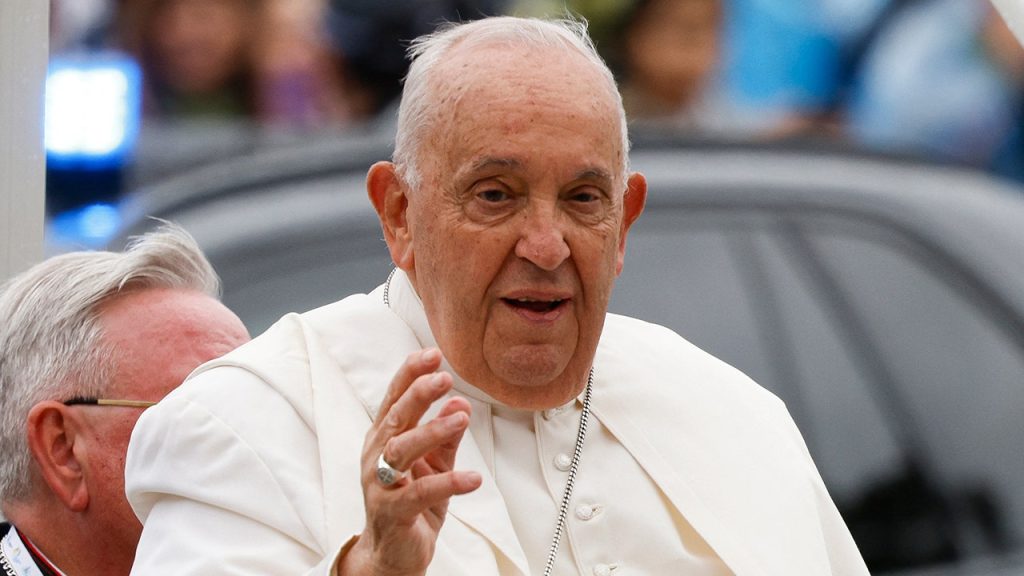Pope Francis, the much-loved leader of the Roman Catholic Church, passed away on Monday at the age of 88 following a lengthy hospitalization due to double pneumonia. His tenure marked significant changes within the Church, earning him widespread admiration among American Catholics. A recent Pew Poll indicated an impressive 78% favorability rating among U.S. Catholics shortly before his death, highlighting his popularity and the profound impact he had on the Church during his twelve years in leadership.
| Article Subheadings |
|---|
| 1) Overview of Pope Francis’ Popularity |
| 2) Successor to Benedict XVI |
| 3) Political Divide Among U.S. Catholics |
| 4) Reforms and Controversies |
| 5) Legacy and Impact |
Overview of Pope Francis’ Popularity
Pope Francis, born Jorge Mario Bergoglio, captured the hearts of millions worldwide with his approachable demeanor and progressive views on social issues. A recent Pew Poll revealed that 78% of American Catholics expressed a favorable opinion of him just before he was hospitalized for a case of double pneumonia. Throughout his papacy, his approval ratings remained consistently high, peaking at an extraordinary 90% in February 2015. This consistent popularity underscores his unique ability to connect with the faithful and offers insight into his influence among the Catholic community, particularly in the United States.
Successor to Benedict XVI
In March 2013, Pope Francis succeeded Benedict XVI, who made headlines as the first pope to resign in nearly 600 years. The transition to Francis was significant; he brought a fresh perspective that emphasized mercy, humility, and inclusivity, appealing to a broad spectrum of Catholics across the globe. His approach contrasted sharply with that of his predecessor, whose favorability ratings fluctuated between 67% and 83% during his tenure. This change heralded a new era for the Church, as Francis sought to address some of its most pressing issues, from social justice to economic inequality.
Political Divide Among U.S. Catholics
Despite his broad support, there exists a notable political divide among U.S. Catholics regarding their opinions of Pope Francis. Recent polling data indicates that 88% of U.S. Catholics who identify as Democrats or lean Democratic hold a favorable view of the pope. In stark contrast, only 69% of those who identify as Republicans or lean Republican share a positive opinion. This discrepancy highlights how Francis’ progressive stances on various issues, including immigration and environmentalism, resonate more with Catholic Democrats than Republicans. Notably, even with critiques of certain policies from the current U.S. administration, nearly two-thirds of Catholic Republicans still expressed support for him, showcasing the complexity of his appeal.
Reforms and Controversies
Pope Francis’ papacy was marked by a series of attempts to reform the Catholic Church’s image and practices. His calls for greater inclusion, particularly regarding LGBTQ+ rights and the role of women in the Church, garnered both accolades and criticism. Many saw these efforts as necessary updates for a modern Church grappling with declining attendance and relevance. However, this push for progress also faced resistance from more conservative factions within the Church, leading to increased polarization. Critics within these circles argued that his reforms dilapidated traditional values, resulting in a fractious relationship between the pope and some clergy members.
Legacy and Impact
Pope Francis’ legacy is characterized by a strong social justice agenda that emphasizes the Church’s role in championing the marginalized. His dedication to issues such as poverty and the plight of migrants reflected a commitment to social equity, which has resonated deeply with many Catholics. Political scientist Wayne Lesperance noted that Francis’ focus on lifting up the poor aligns more closely with the values of Catholic Democrats. Nonetheless, his broader message of compassion and inclusivity is expected to leave a lasting influence on the global Catholic community, encouraging churches worldwide to adopt a more compassionate stance toward pressing social issues.
| No. | Key Points |
|---|---|
| 1 | Pope Francis passed away at the age of 88 after a hospitalization due to pneumonia. |
| 2 | He held a strong favorability rating among American Catholics, peaking at 90% in 2015. |
| 3 | The pope succeeded Benedict XVI in 2013, bringing a progressive approach to the papacy. |
| 4 | Opinions of Francis vary significantly between Democratic and Republican Catholics in the U.S. |
| 5 | His legacy emphasizes social justice and compassion, challenging traditional Church norms. |
Summary
Pope Francis’ death marks the end of a significant chapter in the history of the Catholic Church, shaped by his reforms and inclusive approach. His extensive influence is reflected in the support he garnered from U.S. Catholics, illustrating a longing for change and social justice within the Church. Despite the controversies and challenges he faced, his legacy will likely continue to inspire future leaders to pursue compassion and transformative reform, resonating with the core values of the faith.
Frequently Asked Questions
Question: What major reforms did Pope Francis introduce during his papacy?
Pope Francis introduced reforms aimed at fostering inclusivity, addressing issues related to poverty, and advocating for social justice, especially for marginalized communities and populations struggling with inequality.
Question: How did Pope Francis’ popularity compare to his predecessors?
Pope Francis enjoyed significantly higher favorability ratings among American Catholics compared to his predecessor, Pope Benedict XVI, particularly during his early years in papacy, reaching as high as 90% in 2015.
Question: What were the main challenges Pope Francis faced during his time as pope?
Throughout his papacy, Pope Francis faced challenges related to conservative backlash against his progressive reforms, political polarization within the Church, and managing the expectations of a global Catholic community grappling with contemporary issues.


